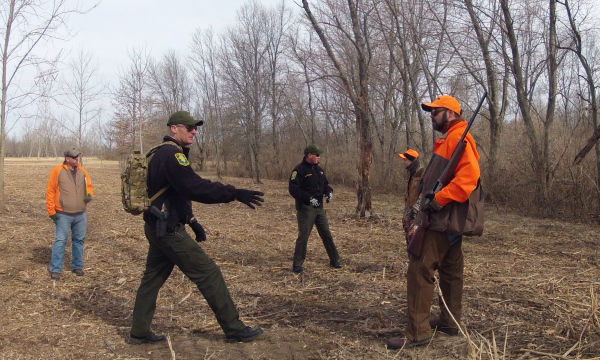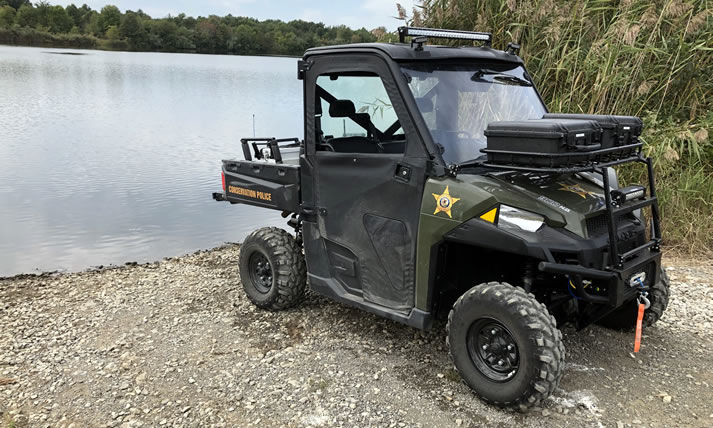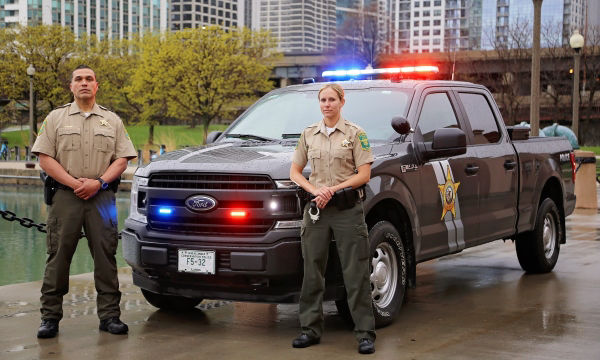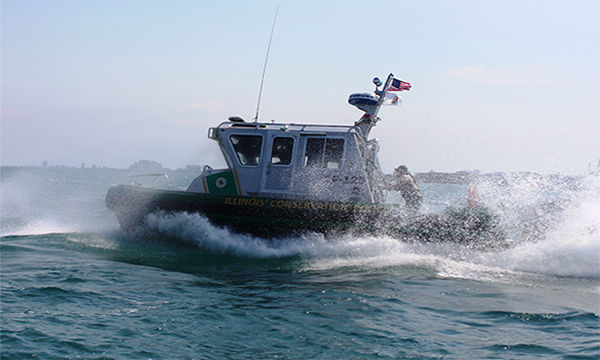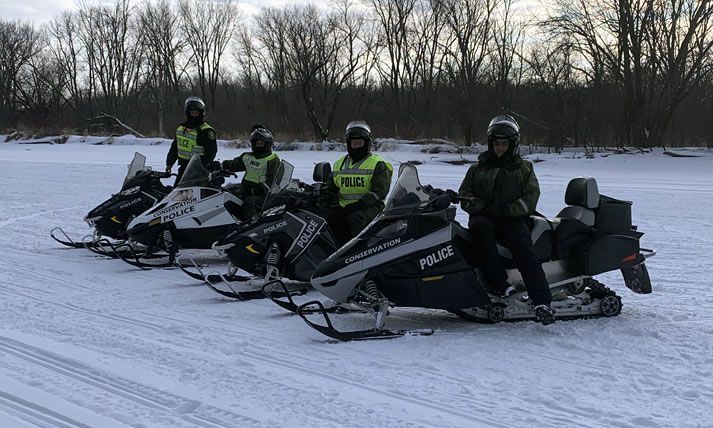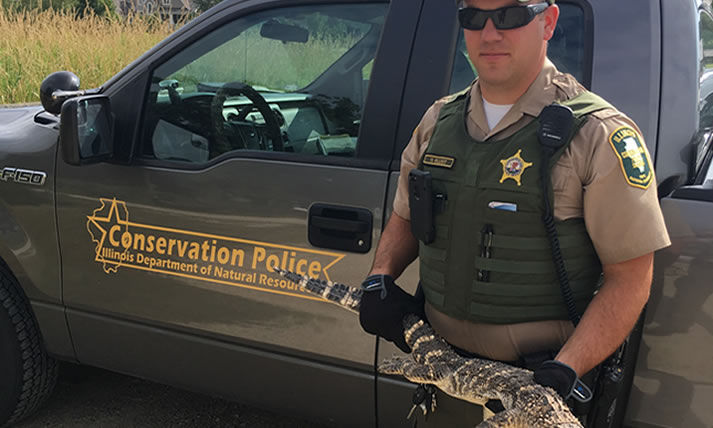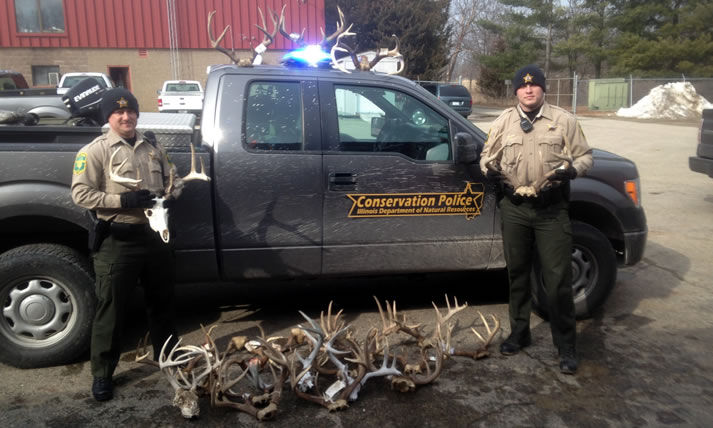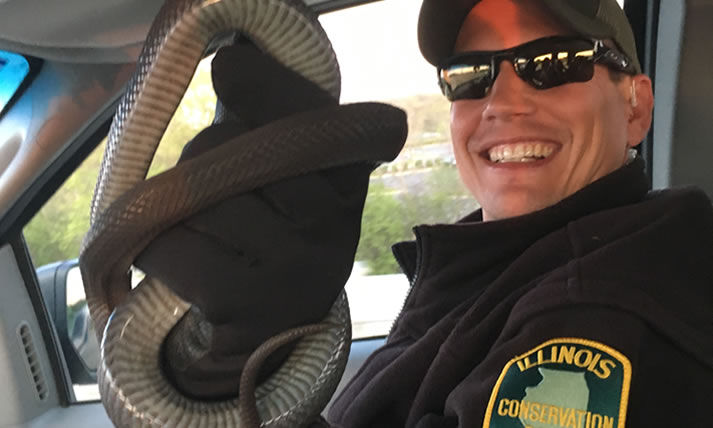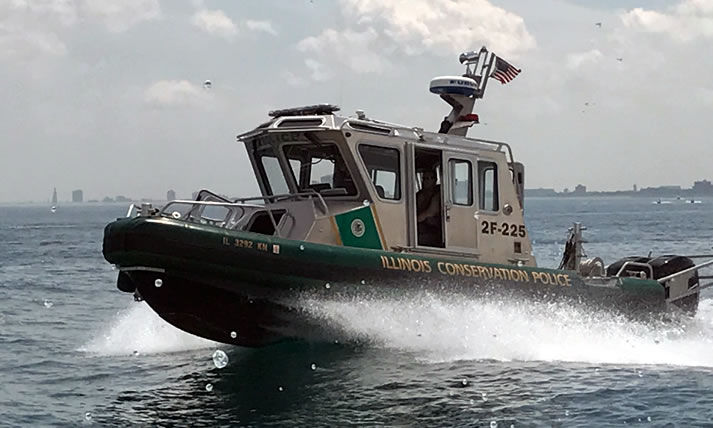Conservation Police Officer Career Opportunities
- Teaser0
- Teaser1
- Teaser2
- Teaser3
- Teaser4
- Teaser5
- Teaser6
- Teaser7
- Teaser8
- Teaser9
We are hiring!
Explore job opportunites with the Illinois Department of Natrual Resources by becoming a Conservation Police Officer.
This page provides information for individuals interested in becoming Conservation Police Officer Trainees:
Questions about employment opportunities, hiring process, training programs and job duties should be directed to
IDNR Office of Law Enforcement
Training Section
One natural Resources Way
Springfield, IL 62702
217-785-8407
DNR.LawTraining@illinois.gov
Eligibility Requirements
20 ILCS 805/805-535 Any
person hired by the Department of Natural Resources for a sworn law enforcement
position or position that has arrest authority must meet the following minimum
professional standards
- At the time of hire, the
person must be not less than 20 years of age and have successfully completed an
associate's degree or 60 credit hours at an accredited college or university.
Any person so hired shall not have power of arrest, nor shall he or she be
permitted to carry firearms, until he or she reaches 21 years of age;
- The person must possess the
skill level and demonstrate the ability to swim at a competency level approved
by the Department in an administrative rule; and
The person must successfully obtain certification pursuant to the Illinois Police Training Act and must also successfully complete the Conservation Police Academy training program, consisting of not less than 400 hours of training, within one year of hire.
Notwithstanding any provision to the contrary, all persons who meet one of the following requirements are deemed to have met the collegiate education requirements:
have been honorably discharged and who have been awarded a Southwest Asia Service Medal, Kosovo Campaign Medal, Korean Defense Service Medal, Afghanistan Campaign Medal, Iraq Campaign Medal, or Global War on Terrorism Expeditionary Medal by the United States Armed Forces;
are active members of the Illinois National Guard or a reserve component of the United States Armed Forces and who have been awarded a Southwest Asia Service Medal, Kosovo Campaign Medal, Korean Defense Service Medal, Afghanistan Campaign Medal, Iraq Campaign Medal, or Global War on Terrorism Expeditionary Medal as a result of honorable service during deployment on active duty;
have been honorably discharged and served in a combat mission by proof of hostile fire pay or imminent danger pay during deployment on active duty; or
- have at least 3 years of
full active and continuous military duty and received an honorable discharge
before hiring.
The IDNR has adopted an administrative rule listing those disciplines that qualify as directly related areas of study. Administrative Rule 2050.30
Conservation Police Officer Trainee (CPOT) Testing and Hiring Process
- Each phase of the hiring process takes place on prescheduled dates at prescheduled locations. Due to the logistics of establishing this process and budgetary constraints, individual accommodation requests for any of the process phases will not be granted.
- Successful applicants are invited to participate in the Peace Officer Wellness Evaluation Report ("POWER" Test). This test is designed to assess aerobic capacity (1.5-mile run), strength (bench press), muscular endurance (one-minute sit-ups), and flexibility (sit & reach test). Applicants must pass all four tests to continue in the hiring process. POWER test standards
- Applicants successfully completing the POWER test, are invited to complete a swimming competency test, demonstrating the ability (without the use of swimming aids) to:
- swim 150 yards continuously without stopping or touching the bottom;
- continuously tread water for 2 minutes without touching the bottom or sides of the pool;
- retrieve an object of contrasting color weighing 5 pounds from a minimum 7-foot depth and deliver the weight to the side of the pool keeping both hands on the weight at all times; and
- exit the pool water without the use of ladder or steps
- Oral Interview - Oral interviews will be scheduled for individuals with the highest graded application who successfully complete the SWIM test. The oral interview helps to assess communication skills, experience, knowledge, and abilities, and to ascertain the applicant’s qualifications for the job.
- Psychological Examination - Selected applicants will be required to take a psychological examination that consists of both written and oral exams. Successful applicants must be deemed suitable for law enforcement and employment as a CPOT.
- Medical Examination - All successful applicants will also be required to pass a medical examination conducted by the department’s choice of medical facility. Once hired, the new employee is officially titled a CPOT for a minimum of one full year. The new officer’s training is very intense.
- Applicants must submit to a background investigation, including providing references, a signed waiver of release of personal information and credit reports, college transcripts, and past military or employment records.
Training New Officers
CPOTs must complete a basic
law enforcement academy, the IDNR Conservation Police Academy, and field
training.
The first academy is a 16-week program mandated by the Illinois Law Enforcement Training & Standards Board entitled the "640-Hour Basic Law Enforcement Course." The curriculum prepares the recruit to function as a peace officer and focuses on human behavior, pertinent Illinois statutes, patrol techniques and investigations, police proficiency skills, and traffic enforcement. Current full-time sworn law enforcement officers in Illinois may have the “Basic Law Enforcement Course” waived if the Department deems them eligible.
The second academy is a 14-week Conservation Police Academy. The 560-hour curriculum focuses primarily on Conservation-related topics such as wildlife enforcement; sport and commercial fisheries enforcement; watercraft safety equipment, registration, operation, and accident investigation; snowmobile laws; operation of watercraft and snowmobile under the influence laws; IDNR Administrative Rules & Regulations, licenses and permits; state park and site regulations; endangered species protection; timber buyers and forest products transportation acts; applicable U.S. Fish & Wildlife laws; commercial establishments; officer survival; and enforcement techniques, procedures, and proficiency skills.
The Field Training Program (FTP) will begin upon the completion of the Conservation Police Academy. CPOTs are assigned to rotating field locations within the state and receive "on-the-job" training by working with veteran Field Training Officers (FTO’s).
Employment Facts
Although
CPOs have full police authority in the enforcement of all Illinois Compiled
Statutes, their primary enforcement mission is to focus on laws and activities
associated with natural resource protection and recreational safety. Examples
of these duties include:
- Enforcing criminal laws, vehicle laws, drug laws, etc. in the State Parks.
- Patrolling Illinois lakes and rivers to check boating safety equipment and watercraft registration. Responding to boating accidents.
- Enforcing the fish and wildlife laws (checking hunters, trappers, sport and commercial fishermen for licenses, fish & game size/possession limits, season dates and hours, etc.) enforcing the Federal fish & wildlife laws.
- Enforcing timber buyers and forest products transportation laws; endangered species laws; snowmobile registration and operation laws; commercial establishments (e.g., fur buyers, taxidermists, fish markets) and Departmental (IDNR) administrative rules and regulations.
- Assisting other law enforcement agencies in helping with certain emergency/rescue situations.
- Not all the duties involve enforcement. A CPO’s workload involves non-enforcement activities as well.
- Public speaking at sports or hunt clubs, civic organizations, school classrooms, etc.
- Staffing information booths at major sports, travel, or boating expositions and during “Law Enforcement Career Days” at specific colleges, universities, and high schools in Illinois.
- Assisting with hunting, boating, and snowmobiling safety education programs.
- Providing instruction to other police agencies in certain “conservation type” laws or related enforcement procedures.
- Working with college students who earn credit hours in an internship program.
- Attending various in-service type training programs as well as specialized training, such as forensics, commercial establishments, sonar use, waterfowl enforcement, interview and interrogation, DUI and OUI enforcement, and accident investigation (boating, hunting, snowmobile, etc.).
Additional Information
Work Schedule:
Officers work the hours of highest activity, which varies from season to season. CPOs are assigned to a nine-hour, 5 on 3 off rotating work schedule (e.g., Week 1, Thursday-Saturday off; Week 2, Friday-Sunday off; Week 3, Saturday-Monday off; Week 4, Sunday-Tuesday off; Week 5, Monday-Wednesday off, etc.)
Field Placement and Transfers:
Applicants must be willing to relocate anywhere in the state following completion of the Academy and FTO programs. Transfers are contingent upon seniority and geographic openings. CPO’s must live within their county of assignment or within 30 minutes of the border of the assigned county.
CPOs may volunteer for specialized training allowing them to instruct in various programs, such as firearms, officer survival/arrest and control tactics, sonar, academy advisors, field training officers, etc.
Promotional opportunities are contingent upon vacancies becoming available within the rank structure.



